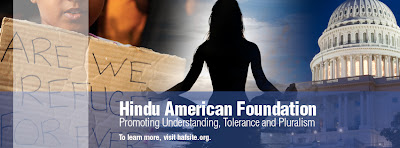---------- Forwarded message ----------
From: Hindu American Foundation
Date: Fri, Jun 7, 2013 at 6:04 AM
Subject: Voiceless Hindu Minorities Suffer Indignity and Injustice, HAF Deplores at National Press Club
To: Gopi Chand (PHP)
Voiceless Hindu Minorities Suffer Indignity and Injustice,
HAF Deplores at National Press Club
Washington, D.C. (June 7, 2013) -- "All they want is peace," said Samir Kalra, Esq., the Hindu American Foundation (HAF)'s Director and Senior Fellow for Human Rights, while describing his conversations with Pakistani Hindu refugees to a standing room only audience at the National Press Club in Washington, D.C. on Wednesday. The Press Club event marked the formal release of the Foundation's ninth annual human rights report, entitled Hindus in South Asia and the Diaspora: A Survey of Human Rights 2012, intended to give voice to Hindu minorities that have "suffered indignity and injustice in silence" in many countries around the world.
The report provided detailed accounts of human rights violations in the areas of: violence against women, forced conversions, mass violence, temple destruction, socio-political ostracization, economic and political marginalization, and discriminatory laws in nine countries and one state in India.
HAF's latest report marked a departure from previous years and featured a new and revamped format, categorizing countries based on the extent of their human rights violations, while including expanded coverage of Hindu refugee populations from Bhutan and Pakistan.
"This year's report represents an evolution of HAF's human rights work and a new focus on providing direct humanitarian assistance to Hindus displaced from their countries of origin," said Kalra, who visited Pakistani Hindu refugee camps in Jodhpur, India earlier this year. "While advocating on larger systemic human rights issues is vital, it is equally important to address the basic needs of these refugee populations."
Kalra was joined at the briefing by Professor Ved Nanda, a world-renowned expert on international law and the Thompson G. Marsh Professor of Law at the University of Denver, and Professor Sachi Dastidar, Distinguished Service Professor in the Politics, Economics and Law Department at State University of New York, Old Westbury and an expert on the plight of Hindu and other non-Muslim minorities in Bangladesh.
During his talk, Professor Nanda noted the growing importance of human rights within the international legal framework and praised HAF for its commitment to consistently raising these issues with U.S. policy makers. Similarly, Professor Dastidar provided an overview of violence against minorities in Bangladesh and the country's slide from secular democracy to one with increasing extremism and intolerance. In addition to Bangladesh, Afghanistan, Malaysia, and Pakistan garnered the greatest censure from the Foundation and were labeled as Egregious Violators for engaging in or allowing rampant and systematic violations to take place against their minority Hindu populations.
"It's critical that human rights concerns are not ignored in light of our larger geopolitical interests in these countries," said Suhag Shukla, Esq., HAF's Executive Director and Legal Counsel. "We cannot achieve our national security objectives in South and Southeast Asia without addressing the lack of religious freedom and fundamental civil liberties that exists in the region."
Other countries or regions covered in the report included Bhutan, the Indian state of Jammu and Kashmir, and Sri Lanka, which were labelled as Countries of Serious Concern for committing severe human rights violations against their Hindu minority, but not rising to the level of Egregious Violators. And the last category, Monitored Countries, encompassed those nations with a history of violations against the Hindu community, such as Fiji and Trinidad and Tobago, but where conditions had improved in recent years. The one exception was Saudi Arabia, which only has a small population of Hindu migrant workers and lacks available data on violations against Hindus to appropriately assess the situation.
The Foundation also featured its new documentary film on Pakistani Hindu refugees at the press briefing, entitled "Victims of History: The Untold Story of Pakistani Hindus in India."
For media inquires contact, Samir Kalra, Esq. at samir@hafsite.org or 202-223-8222.





















